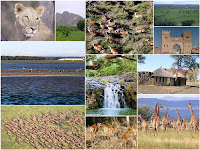Can coral reefs be protected?
 With the seas being continuously and increasing polluted; with air and sea temperatures rising; with fishing becoming more intensive and extensive - can coral reefs be protected? Scientists predict that 70 per cent of the world’s coral reefs may well be destroyed over the next 20-40 years, unless we stop cyanide fishing, pollution, sewage, erosion and clumsy tourism. Plans are being made to give coral reefs more and better protection; if the plans succeed, our Planet will be better off:
With the seas being continuously and increasing polluted; with air and sea temperatures rising; with fishing becoming more intensive and extensive - can coral reefs be protected? Scientists predict that 70 per cent of the world’s coral reefs may well be destroyed over the next 20-40 years, unless we stop cyanide fishing, pollution, sewage, erosion and clumsy tourism. Plans are being made to give coral reefs more and better protection; if the plans succeed, our Planet will be better off:Coral reefs occupy less than one percent of the Earth’s marine environment, but are home to more than a quarter of all known marine fish species and tens of thousands of other species found nowhere else on earth. Reefs also serve as a buffer against incoming storm surges, protecting local populations. Unfortunately, many coastal ecosystems are threatened by human activities including overfishing, agriculture, and urban development. The degradation of coastal ecosystems not only results in a loss of biodiversity but also a loss of revenue, depleted fish stocks and increased exposure of communities to storms. WRIConservationists, and most of us who care about our Planet, are now pinning their hopes on MAPs: facing a host of threats including fishery devastation and the destruction of coral reefs, conservationists have increasingly pinned their hopes on marine protected areas. Poorer countries with less money and who are the least contributors to coral reefs devastation, are the least likely to contribute much to the protection of the reefs; rich countries which have caused most of the destruction - can and should do more to support the conservation of coral reefs.


